Stride4Stride kick-off meeting and conference: skills matching in challenging times
10/11/2020
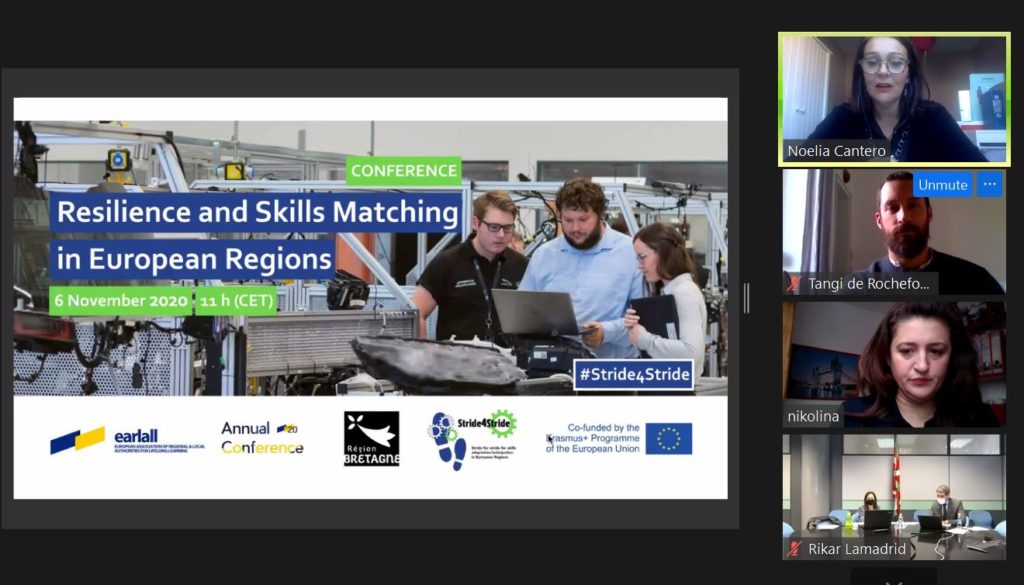
EARLALL and Brittany Region hosted on 6 November the online conference “Resilience and Skills Matching in European Regions” on the occasion of the Stride4Stride project kick-off meeting and EARLALL Annual Conference 2020. Stride4Stride aims at exchanging best practices and finding new solutions in matching skills provision and labour market needs in 6 European regions.
Participants to the conference were welcomed by Tangi de Rochefort, Stride4Stride project coordinator and Project Manager for Innovation, Employment and Business at the Directorate for Employment and Lifelong Learning of Brittany Region. Then, a policy introduction by the OECD was followed by best practice presentations regarding how the COVID-19 outbreak affected skills matching strategies at regional level.
Jonathan Barr (Head of the Employment and Skills Unit, Local Employment, Skills, and Social Innovation Division, Centre for Entrepreneurship, SMEs, Regions, and Cities at OECD) introduced the role of local employment and economic recovery by presenting data from OECD countries. He stated that regional and local governments are on the frontlines of managing the crisis and its recovery on areas such as communications and awareness; social distancing measures; continuity of public services; workplace access and transport; support to vulnerable groups; and support to firms. Key findings also point at the city-rural gap, with cities having a greater share of occupations amenable to teleworking, and the acceleration of digitalisation and automation in many sectors.
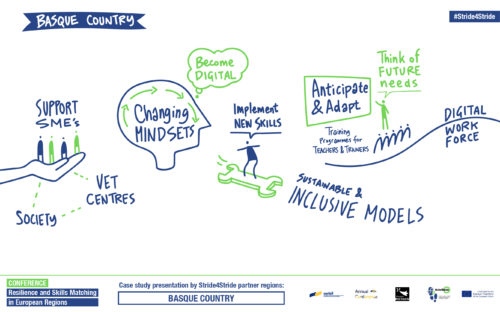 |
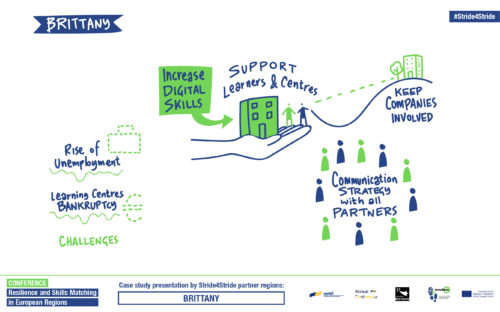 |
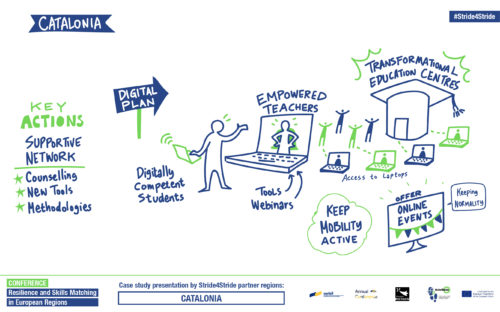 |
Regional best practices followed. Rikardo Lamadrid (Director of Technology and Advanced Learning at the Basque Vice-Ministry for VET) introduced the Basque Vocational Education and Training Strategy within the educational system in the context of the pandemic, including also a strategy supporting the health sector and a strategy supporting Basque companies, particularly SMEs and MicroSMEs. In terms of internationalisation, support was provided at the request from the Chilean Ministry of education and adaptations were also made within the European dimension, including information exchange via EARLALL. His presentation was followed by Tangi de Rochefort, who introduced the main challenges identified in Brittany: saving lifelong learning centers from bankruptcy, trying to make training restart fast, and preventing dropout. Among others, measures to tackle them included legal pathways for lifelong learning centres economic health, provision of an LMS Platform to help centers to organise distance training by distance, and a new communication strategy.
Maria Pascual (Head of Unit of International and Cooperation Projects for VET, Department of Education, Government of Catalonia) and Irma Núñez (Project manager of International and Cooperation Projects for VET, Department of Education, Government of Catalonia) introduced the key measures implemented in the Catalan education system to support VET centres. These included promoting new tools , digitalization and methodologies for teaching and learning (ImpulsFP); tools for online counselling (OrientFP); fostering digital project based learning (ActivaFP); planifying strategies to adapt skills provision to new labour market needs (FuturaFP); supporting and promoting DUAL professional training through a research team (EmpresaFP); and designing blended/virtual mobilities for students and teachers, as well as fostering best practice exchange (MobilitatFP).
Miriana Bucalossi (Head of the VET Policies and European Project Management Unit at Tuscany Region) and Silvia Duranti (Researcher at Istituto Regionale per la Programmazione Economia della Toscana, IRPET) presented the situation in Tuscany. Key findings include the fact that interaction between the teachers/trainers and the students was key and was facilitated thank to the virtual environment provided. Furthermore, in the commerce and retail sector, the companies hosting the trainees decided to transform most of the traineeships in proper employment contracts (e.g. big supermarket chains), and for traineeships that could take the shape of a distance experience, the Region elaborated guidelines to legally adapt them to the situation and make them ‘safer’, addresing the three stakeholders involved in any traineeship: company, trainee and the ‘promoter’ (usually, public employment services).
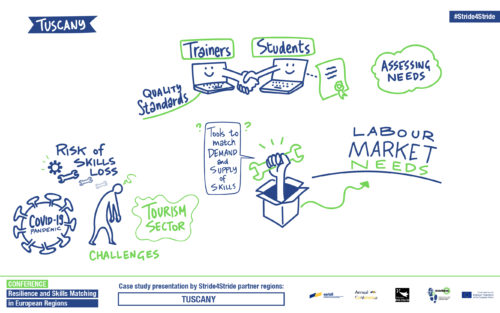 |
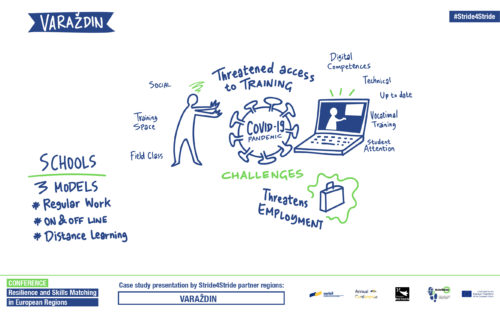 |
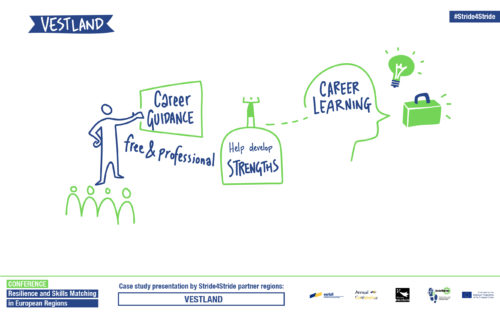 |
Nikolina Vlahek (Srednja strukovna škola Varaždin, Varaždin County) introduced the challenges and measures identified in Varaždin. Key challenges include the implementation of vocational practical classes, ensuring sufficient space in classrooms, lack of quality monitoring of online classes, limitations of distance learning, and practical work in direct contact with the customer for apprenticeships. Lastly, Kjell Helge Kleppestø (Senior Manager, Careeer Guidance Centers, Vestland County Council), and Jostein Eitrheim (GM Hardanger Council) presented how the situation was managed in Vestland, where the COVID-19 added to other challenges such as demographic shortages in rural areas (young people leaving areas such as Hardanger), which are being overcome by establishing a strong cooperation between education centres and businesses.
Presentations
- From pandemic to recovery: Local employment and economic development, Jonathan Barr, OECD
- Brittany Region, Tangi de Rochefort
- Basque Country, Rikardo Lamadrid
- Catalonia, Maria Pascual and Irma Núñez
- Tuscany, Miriana Bucalossi (Tuscany Region) and Silvia Duranti (IRPET)
- Varaždin County, Nikolina Vlahek (Srednja strukovna škola Varaždin)
- Vestland County Council, Kjell Helge Kleppestø (Careeer Guidance Centers) and Jostein Eitrheim (GM Hardanger Council)
Useful links
- Conference report
- More information about the Stride4Stride project
- Skills & Labour Market working group
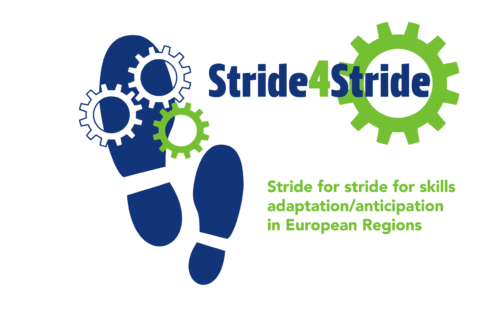 |
 |




